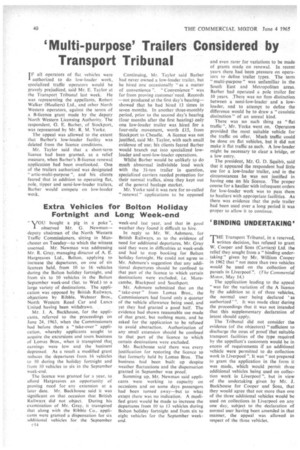'Multi-purpose' Trailers Considered by Transport• Tribunal
Page 42

If you've noticed an error in this article please click here to report it so we can fix it.
IF all operators of flat vehicles were authorized to do low-loader work, specialized traffic operators would be gravely prejudiced, said Mr. E. Taylor at the Transport Tribunal last week. He was representing the appellants, Robert Walker (Hauliers) Ltd., and other North Western operators, against the terms of a B-licence grant made by the deputy North Western Licensing Authority. The respondent, G. E. Barber, of Stockport, was represented by Mr. R. M. Yorke.
The appeal was allowed to the extent that Barber's low-loader facility was deleted from the licence conditions.
Mr. Taylor said that a short-term licence had been granted, as a relief measure, when Barber's B-licence renewal application had been overlooked. One of the trailers authorized was designated " artic-multi-purpose ", and his clients feared that in addition to operating flat, pole, tipper and semi-low-loader trailers, Barber would compete on low-loader work. Continuing, Mr. Taylor said Barber had never owned a low-loader trailer, but he hired one occasionally "as a matter of convenience ". "Convenience" was far from proving customer' need. Records —not produced at the first day's hearing— showed that he had hired 13 times in seven months. In another three-monthly period, prior to the second day's hearing (four months after the first hearing) only one low-loader trailer was hired for a four-mile movement, worth £15, from Stockport to Cheadle. A licence was not justified, said Mr. Taylor, with such small evidence of use; his clients feared Barber would branch out into specialized lowloader and semi-low-loader operations.
Whilst Barber would be unlikely to do much abnormal indivisible load work with the 3-1-ton trailer in question, specialized carriers needed protection for their normal traffics, since they kept out of the general haulage market.
Mr. Yorke said it was rare for so-called " renewal " applications to be opposed and even rarer for variations to be made of grants made on renewal. In recent years there had been pressure on operators to define trailer types. The term " multi-purpose " was unfamiliar in the South East and Metropolitan areas. Barber had operated a pole trailer for 10 years. There was no firm distinction between a semi-low-loader and a lowloader, and to attempt to define the difference would be to draw a "casuistic distinction" of an unreal kind.
There was no such thing as "flat traffic ", Mr. Yorke went on. Operators provided the most suitable vehicle for the traffic on offer. Much traffic could be done on at vehicles, but it did not make it flat traffic as such. A low-loader might be necessary to clear a bridge, or a low entry.
The president, Mr. G. D. Squibb, said that it appeared the respondent had little use for a low-loader trailer, and in the circumstances be was not justified in having one on his licence. The proper course for a haulier with infrequent orders for low-loader work was to pass them to hauliers with appropriate facilities. As there was evidence that the pole trailer had been used over a long period it was proper to allow it to continue.
'BINDING UNDERTAKING'
THE Transport Tribunal, in a reserved, written decision, has refused to grant W. Cooper and Sons (Carriers) Ltd. the relief they sought from a "binding undertaking" given by Mr. William Cooper in 1962 that "not more than two vehicles would be used on the collection of parcels in Liverpool ".. (The Commercial Motor, May 14.)
The application leading to the appeal "was for the variation of the A licence by the addition to it of three vehicles, the normal user being declared 'as authorized ' ". It was made clear during the proceedings that it was not intended that this supplementary declaration of intent should apply.
The Tribunal did not consider the evidence (of the objectors) "sufficient to discharge the onus of proof that suitable transport facilities of the type required by the appellant's customers would be in excess of requirements if an additional vehicle were permitted to do collection work in Liverpool ". It was " not prepared to grant the application in the form it was made, which would permit three additional vehicles being used on collection work in Liverpool", but in view of the undertaking given by Mr. J. Backhouse for Cooper and Sons, that they would agree that not more than one of the three additional vehicles would be used on collections in Liverpool on any one day, subject to the declaration of normal user having been amended in that manner, the appeal was allowed in respect of the three vehicles.
























































































































